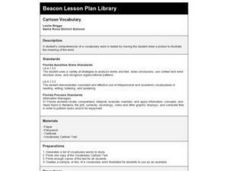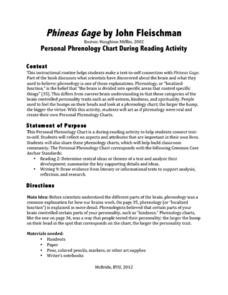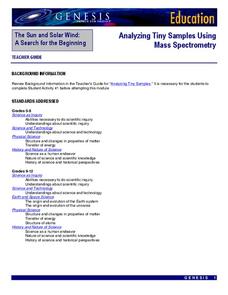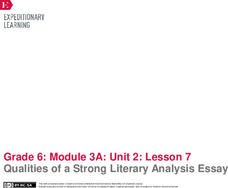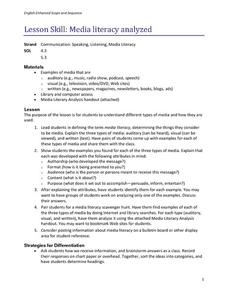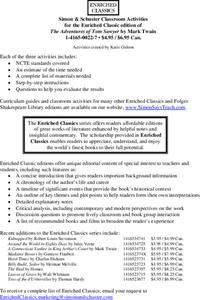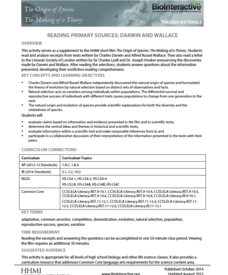Curated OER
Propaganda Techniques
Sixth graders locate examples of persuasive writing. For this persuasive writing lesson students work in a groups to identify and analyze the use of propaganda techniques. Students use newspapers to find editorials, or advertisements,...
Curated OER
Planning A Vacation Online
If you could travel anywhere in the United States, where would you go? Use this question to interest your fourth, fifth, and sixth graders as they experiment with Mapquest or other direction-based resources. They choose where they'd like...
Curated OER
Cartoon Vocabulary
Third and fourth graders complete a vocabulary log which includes a definition, and a sentence that demonstrates the meaning of the word. Then make an illustration that represents the definition of the word. The trick is that they may...
Curated OER
Persuasive Elements
Investigate letters to the editor and their persuasive qualities. Break your class into reading groups and give each one a different article. As they read, they complete a graphic organizer to record their thoughts and opinions. There is...
New York State Education Department
TASC Transition Curriculum: Workshop 10
How have educational standards evolved? Educators of adults examine expectations in the 10th workshop out of 15 to better determine how standards have grown. Participants respond to a variety of sample questions to determine how they...
EngageNY
Analyzing Point of View: Inferring about the Impact of Hurricane Katrina on People Living in New Orlean
What, where, how? Readers hone their analysis skills as they determine the narrator's point of view in Eight Days. They complete a literary analysis chart and essay to describe what and where events take place. Individuals then discuss...
Curated OER
The Grimm Truth—Comparing & Contrasting Children’s Stories and Fairy Tales in Cross-Cultural Texts at Different Points in Time
High schoolers explore world literature through completing several varied exercises. In this compare and contrast lesson plan students compare and contrast stories and how time and culture impacts the stories.
Curated OER
Phineas Gage: Personal Phrenology Chart During Reading Activity
Phrenology, the belief that parts of your brain control certain aspects of your personality, is described in Phineas Gage: A Gruesome but True Story About Brain Science. While we now know much more about the brain, learners use this...
NASA
Analyzing Tiny Samples Using a Search for the Beginning Mass Spectrometry
Teach the basics of mass spectrometry with a hands-on lesson. The fourth in a series of six lessons explores how mass spectrometry measures the ionic composition of an element. Learners then compare and contrast relative abundance and...
EngageNY
Qualities of a Strong Literary Analysis Essay
Read like a writer. Scholars read a model literary analysis in preparation for a similar writing assignment before annotating each paragraph for the gist. Next, pupils devise a list of qualities of a strong literary analysis essay.
Curated OER
Media Literacy Analyzed
Fourth and fifth graders define the term media literacy, then come up with examples that they share with the class. The types of media studied are auditory, visual, and written. Learners get together in pairs and perform a media...
Museum of Tolerance
Documents That Shape Society
The Bill of Rights is a foundational document of American democracy, much like the Nuremberg Laws were a foundational document of the Reichstag of Nazi Germany. But that's where their similarities end. Engage high schoolers in a...
Simon & Schuster
Classroom Activities for The Adventures of Tom Sawyer by Mark Twain
A 16-page packet includes three activities for a unit study of Mark Twain's The Adventures of Tom Sawyer. Before beginning the novel, class members identify the factors in their lives that helped create their frame of reference,...
Literacy Design Collaborative
Rhetorical Analysis for Pre-AP English
Scholars closely analyze the use of rhetorical strategies in several model texts. They work in groups to annotate the text identifying rhetorical elements, and to complete a Rhetorical Analysis chart and guided reading worksheet....
EngageNY
Grade 11 ELA Module 2: Unit 2, Lesson 9
How do authors employ specific word choices to describe complex relationships? Scholars read and analyze the first stanza from Audre Lorde's contemporary poem "From the House of Yemanjá." Pupils determine the meanings of figurative and...
Scholastic
Organization Outline
Forming a strong organizational outline is important when reading a complex text, writing an informative essay, or analyzing a complicated problem. Use a straightforward organization outline to teach learners about concept mapping.
Howard Hughes Medical Institute
Reading Primary Sources: Darwin and Wallace
Take your classes back in time. Learners read real historical texts from both Darwin and Wallace as well as an announcement of their findings. Using guiding questions, they make inferences and draw conclusions from the information in the...
Minnesota Literacy Council
Scientific Method
Here is a resource with a descriptive approach to explaining the scientific method. It's simple, but effective for both introduction and reinforcement of this concept.
University of California
Jewish Holidays
Modern Jewish holidays have ancient roots with many connections to today. Using photographs of primary sources, such as fragments of a shofar, as well as texts, such as the Hebrew Tanakh, learners explore how Jewish holidays reflect...
Classroom Law Project
What do cartoonists see in this election?
Cartoons from the 2008 Presidential election provide the text for a instructional activity designed to help learners understand how political cartoonists use persuasive techniques to present a point of view.
Eastconn
Women of the California Gold Rush
The California Gold Rush was not just an opportunity for the male gold miners sifting for shiny nuggets. Small groups read accounts of the ways women took advantage of the influx of workers to run hotels, bake pies, and wading out into...
National Park Service
A Tale of Two Men
Theodore Roosevelt and the Marquis de Mores were both born in 1858, and both came to the Dakota territory in 1883, but they influenced the developing country of America in different ways. Elementary and middle schoolers apply written and...
University of North Carolina
Statistics
Let's see you back it up! As shown in the 18th handout in the Writing the Paper series of 24 lessons from UNC, statistics help form an effective argument. The handout discusses how to analyze a source and break down the data to ensure it...
EngageNY
Grade 10 ELA Module 2: Unit 1, Lesson 9
How did Martin Luther King Jr. establish tone in his writing? Scholars analyze King's tone and discuss how he changes and refines his claim in "Letter from Birmingham Jail." They also define new vocabulary words, respond to a writing...


